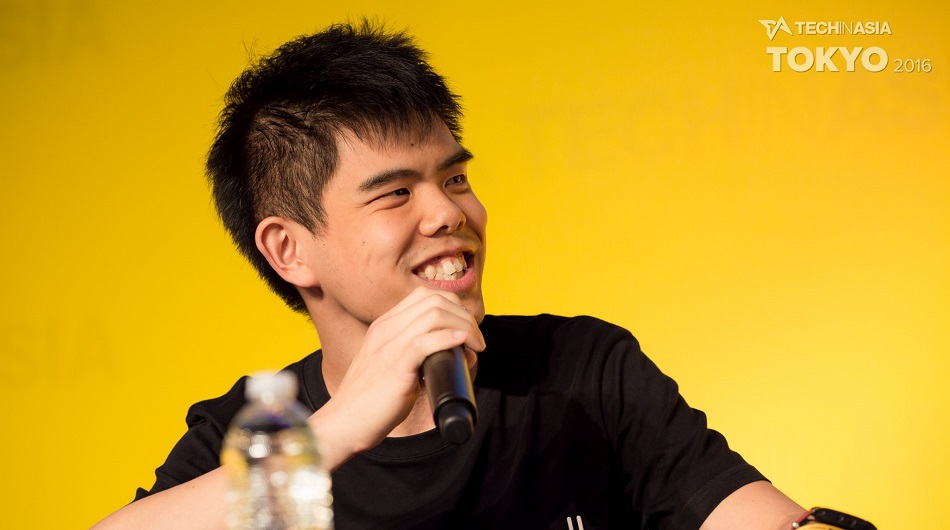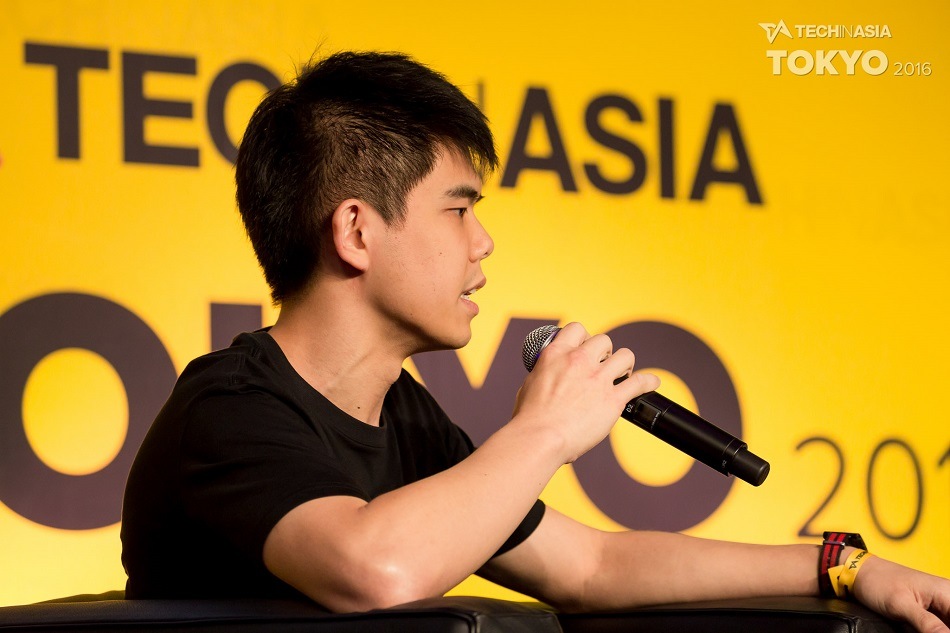
Carousell co-founder and CEO Siu Rui Quek on stage at Tech in Asia Tokyo 2016. Photo credit: Tech in Asia / Michael Holmes.
Ask a startup founder what the initial vision behind their company was, and more likely than not they will say, “to solve a problem.” That’s what entrepreneurs like to bill themselves as; problem-solvers who make the world a better place with their ideas.
Carousell CEO Siu Rui Quek is no exception. On stage at Tech in Asia Tokyo 2016, the co-founder of the Singaporean mobile peer-to-peer (P2P) marketplace told our David Corbin he was an online selling geek who just wanted an easier way for people to buy and sell stuff on the internet.
“We exist because we [Siu Rui and co-founders Lucas Ngoo and Marcus Tan] are three geeks who love technology and want to build things that help people solve problems,” he said. “That’s what kept us going and, with Carousell, we have a lifetime opportunity to do this.”
Squad goals
The startup is active across Southeast Asia and has just launched in Hong Kong. “From day 1 we’ve always been really focused on building a leading company, not because we wanted to make a billion dollars but because we wanted to help a billion people,” Siu Rui said.
He was an online selling geek who just wanted an easier way for people to buy and sell stuff on the internet.
How far the company is from reaching that goal isn’t clear, as Carousell generally doesn’t share user numbers. This time was no exception, with Siu Rui only sharing that the marketplace has over 35 million listings and “millions of users.”
Asked about why startups tend to guard their user numbers so closely, Siu Rui replied that in Carousell’s case, the founders had a slow first year. “Tech blogs said focus on one core metric, so we wondered which one that was for us,” he said.
The team decided that if there was one metric that was material to their sense of progress and success, it was the number of product listings on their platform.
Marketplace wars
Carousell recently raised a series B round worth US$35 million from Rakuten Ventures, Sequoia India, 500 Startups, and Golden Gate Ventures. It gives the startup enough firepower to expand to a new market outside of Southeast Asia.
Siu Rui wouldn’t say which one but said the company likes to pick developed markets where there’s no mobile incumbent. Presumably that rules out Japan where mobile P2P marketplace Mercari reigns.
See: Japan’s hottest unicorn Mercari is charging into the US
Investor Rakuten Ventures has been backing Carousell from the beginning, even though its parent company launched a competing service called Rakuma, which entered Southeast Asia in early 2016. Singapore is also home to a competing app called Shopee, a subsidiary of local digital company Garena.
Siu Rui isn’t too concerned about that. “That’s further validation for us,” he said. “Saemin [Ahn, Rakuten Ventures managing partner,] has been a big supporter from day 1 and he’s the first one who reports bugs to me.”

Siu Rui thinks there’s plenty of room for Carousell to grow in Southeast Asia. Photo credit: Tech in Asia / Michael Holmes.
Community service
Because of the huge number of people still to come online in Southeast Asia, there is still plenty of room to grow, Siu Rui offered. People are also better educated about online shopping in general. And while Carousell considers itself more a classifieds company than an ecommerce company, the tide raises all boats.
“I think when you have liquidity in any marketplace, it’s an opportunity and a challenge. That’s when you also see merchants listing on your platform,” he said. While encouraging more merchants to get on the app could help Carousell’s finances, the team is wary of diluting the community aspect of their product.
As a startup it is a matter of what you prioritize… you have to do what your bandwidth allows.
“As a startup it is a matter of what you prioritize,” Siu Rui explained. “We now have 23 engineers, and we hope to double that by the end of the year, but you have to do what your bandwidth allows.”
Overall, Carousell has a staff of 90 across the region.
Its community has evolved along with the company itself. Siu Rui said the app’s initial audience is usually young – between 15 and 24 – and 75 percent female. Items being bought and sold are 80 percent fashion and beauty products.
Then, as the user base grows, the listings change accordingly. People can even sell furniture and cars through the app now. “We knew we were reaching an older demographic when we started receiving messages saying, ‘I heard about Carousell from my daughter or from my students,’” Siu Rui laughed.
Further expansion doesn’t mean work back home is done anyway. “We’re less than 1 percent done [solving the problem],” he said.
This is part of the coverage of Tech in Asia Tokyo 2016, our conference taking place on September 6 and 7.
This post Carousell would rather serve a billion people than make a billion dollars appeared first on Tech in Asia.
from Tech in Asia https://www.techinasia.com/carousell-tech-in-asia-tokyo-2016
via IFTTT
No comments:
Post a Comment